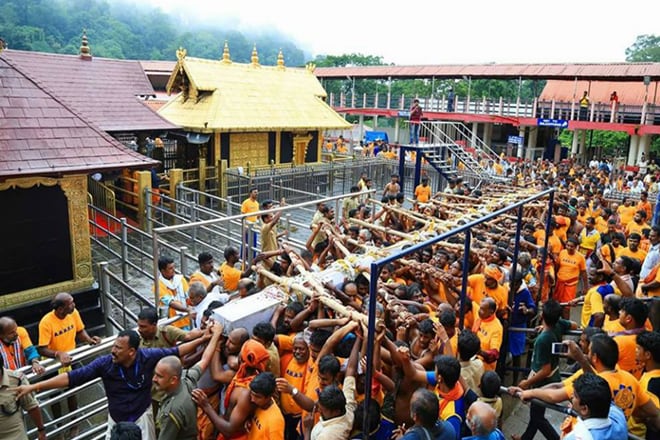While the debate around women’s entry to Sabarimala temple seems to have taken the spotlight, the questions of law are complex and deeply layered. This is exactly why today marks a big day for the Devaswom Board as it argues against the petitioner’s prayer in connection with women’s entry. So, what developments can we expect today? To start with, from 11.30 AM to around 2.30 PM, the Supreme Court is set to hear the arguments of the Travancore Devaswom Board represented by Mr. Abhishek Manu Singhvi, Senior Advocate and thereafter, Mr. K. Parasaran, Senior Advocate, representing the Nair Service Society shall commence his arguments. The All Kerala Brahmins Association, known as the Bramhana Sabha, is also an intervenor and has objected to the prayer made by the petitioners regarding women’s entry.
What are questions of law?
In deciding the case pertaining to the entry of women in Sabarimala temple, here are the questions of law that had been framed as per the referral order dated 13th October 2017 in Indian Young Lawyers Association & Others vs State of Kerala. Not sure what questions of law mean and how they influence the outcome of a case before the apex court? Simply put, the questions of law are a broad framework that indicates the scope of hearing for both sides – the petitioners and the respondents.
Women’s Entry Debate: Five Questions of Law before Supreme Court
Now the Supreme Court shall look into these questions of law before delivering the judgment in the case pertaining to the entry of women of menstruating age in the Sabarimala temple:
1. Whether the exclusionary practice based upon a biological factor exclusive to the female gender amounts to “discrimination” and thereby violates the very core of Articles 14, 15, and 17 and not protected by ‘morality’ as used in Articles 25 and 26 of the Constitution.
2.Whether the practice of excluding women constitutes an “essential religious practice” under Article 25 and whether a religious institution can assert a claim in that regard under the umbrella of the right to manage its own affairs in the matters of religion.
3. Whether Ayappa Temple has a ‘denominational’ character and if so, is it permissible on the part of a ‘religious denomination’ managed by a statutory board and financed under Article 290A of the Constitution of India out of the Consolidated Fund of Kerala and Tamil Nadu can indulge in such practices violating constitutional principles/morality embedded in Articles 14, 15 (3), 39(A) and 51-A(e)?
4. Whether Rule 3 of the Kerala Hindu Places of Public Worship (Authorisation of Entry) Rules permits ‘religious denomination’ to ban entry of women between the age of 10 to 50 years? And if so, would it play foul of Articles 14 and 15(3) of the Constitution by restricting entry of women on the ground of sex.
5. Whether Rule 3 (b) of Kerala Hindu Places of Public Worship (Authorisation of Entry) Rules, 1965 is ultra vires the Kerala Hindu Places of Public Worship (Authorisation of Entry) Act, 1965 and if treated to be intra vires, whether it will be violative of the provisions of Part III of the Constitution?
In the earlier affidavit dated 13.11.2007, the state of Kerala through Joint Secretary, Government Secretariat, Thiruvananthapuram had supported the petitioners and later asserted in an affidavit as follows:
“It is submitted that lakhs of women devotees visit Sabarimala temple every year. However, the restriction of women between the ages of 10 and 50 has been prevailing in Sabarimala since time immemorial. This is in keeping with the “prathishta sankalp” of idol concept of the temple. The same is an essential and integral part of the right of practice of religion of a devotee and comes under the protective guarantee of the Constitution under article 25 and article 26 which had been held to contain a guarantee for rituals, observances, ceremonies and modes of worship which are an essential or integral part of religion. It is then immune from challenge under Article 14. This Honorable Court in Ritu Prasad Sharma vs State of Assam (2015) 9 SCC 461, held that religious customs which are protected under Articles 25 and 26 are immune from challenge under other provisions of Part III of Constitution.”
However, the petitioners had strongly put forth their argument earlier that banning the entry of women would be against the basic tenets of Hindu religion and that the Sabarimala temple does not have a separate and distinct religious denomination.


